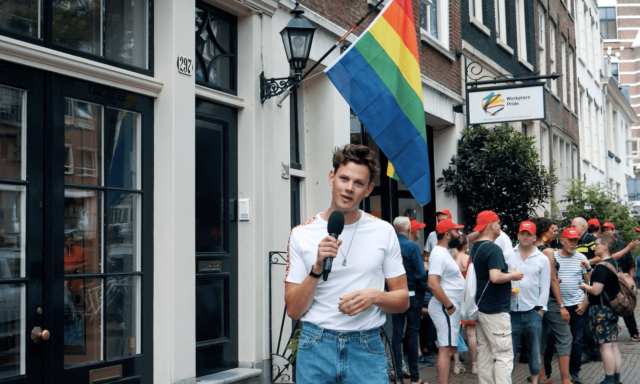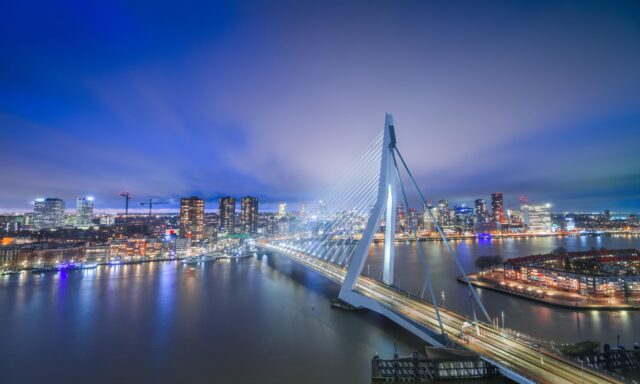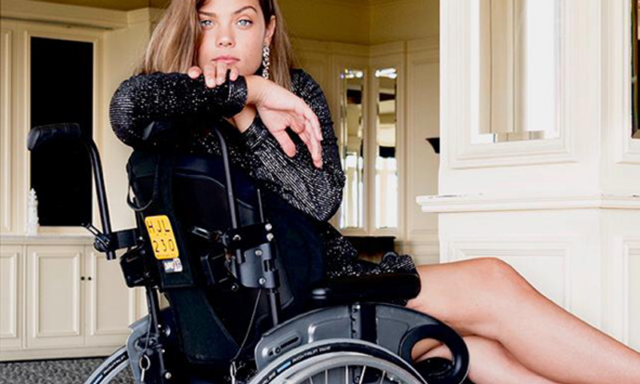The Netherlands is considered to be one of the most progressive countries in the world with regard to LGBTI+ rights. Homosexuality was decriminalised as early as 1811 and the Netherlands was the first country to introduce same-sex marriage in 2001. To this day, the Netherlands is one of the most queer-friendly places in the world, celebrating people’s differences and uniqueness.
However, the safety of queer people is still not guaranteed, with many still being discriminated against for their gender identity, looks and sexual orientation, having to repress themselves and adhere to the gender binary in order to avoid bigotry and be taken seriously in the workplace. So much so, that the Netherlands dropped out of the ILGA’s Rainbow Europe 2021 top 10 countries, which ranks countries on their legal and policy practices for LGBTI+ people in 49 European countries.
Introducing: Remco Boxelaar, one of the loudest voices in the Dutch LGBTI+ community, challenging heteronormativity in the workplace and promoting the inclusion of queer people in cooperation with their organization Corporate Queer.
As a non-binary person who prefers the pronouns they/them, Remco is aware of the struggles that people who differ from the norm have to go through. We talked to Remco about pride month, the queer reality in the Dutch job market and much more!
What is the overall situation for queer people in the workplace?
Remco answers “It depends very much on how deviant you are from the norm.”. “What you see for example at the top of our politics is that white cis gay men emancipate quite well, but if you look at double or triple marginalized groups. For example, trans women or trans women of colour in particular, are in a much more difficult position.” They say that if the behaviour and looks of a person is straight passing, meaning being perceived by others as being straight, they would have less of a hard time at the workplace.
Remco goes on to give a personal example: “When I present myself more gender conform, more according to the M in my passport, I have a much easier day than when I present myself in a gender non-conforming way. More feminine, in jewellery, heels, nail polish…, people are taking me less seriously when I present myself that way. People think that professionalism very much contains the gender binary and if you are something in between or beyond, people are distracted.” Remco finds that people want to express themselves authentically. However, too many are still confronted with micro-aggressions, hurtful comments, or worse. In a broader sense, this touches on the subjects of the psychological and physical safety of queer people in the Dutch workplace.
What are the struggles that queer people face at the workplace, that straight people might not even be aware of?
Corporate Queer developed a framework that distinguishes and differentiates different aggressions against LGBTI+ people at the workplace, in order to detect and handle them appropriately.
Internal soft topics deal with inclusion and a safe company culture.
A management team or a board of executives might have the best intentions in mind. However, if they are not queer, if they do not have a disability or are discriminated against because of the colour of their skin, trying to create a company culture for a diverse team is challenging. This is because do not know what struggles these minorities have to deal with. Internal soft topics are all about setting healthy and inclusive boundaries and acting on them.
Internal hard topics deal with policies in the workplace, or the lack thereof.
Remco gives the example, that if they were to adopt a child with their partner, they would not be entitled to paid leave, even though they would still have to take care of a newborn child. Remco, as well as many other people who are not able to bear a child, would have to negotiate with their employer and risk using their holiday days in order to support their family. Being an inclusive employer means working around the lack of a multiparent law. Being a frontrunner who proactively thinks ahead.
External Soft topics deal with how a company presents itself in external communication.
Do minorities feel represented in the language that is being used, in the images that are being shown or the products or services that a company offers? What does the internal team look like on your website, is the company staff diverse? Does a minority person feel represented when viewing the company?
External Hard topics deal with how physically inclusive the company is.
Things such as the toilets a company offers, what type of uniform is required to be worn behind the reception desk, or the accessibility of the company for clients with disabilities. All these would fall under the umbrella of external hard topics.
What is a positive experience you can tell us about of a person who felt safe coming out in their workplace? Did it affect job performance, company culture, other employees, etc.?
“I get the most heartwarming texts of people that after a talk we had given there, felt empowered to come out. With the Corporate Queer movement, I feel we are really making a change. Not directly from one day to the other making it (the workplace) a safe space…but at least opening up the conversations about safety and what it means to be safe and included at work.
To give you an example, I explained what it means to be a non-binary person (during a talk at a company) and that I myself am non-binary, and someone unmuted and said very emotionally “…this is the first time that I’ve met a non-binary person.” and felt comfortable to come out to their company as non-binary as well.”
What does pride month mean to you? Do you feel it’s appropriate for uninvolved companies to participate?
Remco speaks of an amusing example of an underwear company, whose effort during pride month narrowed down to putting a rainbow on their men’s underwear in support. “If you really want to be inclusive, develop boxershorts for trans men who might not have a penis but would like to wear boxers, or make binders to help push down their breasts. That would be much more inclusive than just sticking a rainbow on the existing underpants for a month.”
You mentioned in the Diversity and Inclusion Discussion we hosted, that it’s easy for a group of people to be inclusive of the status quo. How does a traditional company with good intentions signal that they are welcoming to all?
Like in many other areas of business, practising what you preach is the first step in establishing credibility, Remco explains. Trying to put an image of a company out there, by using diverse stock images, wording and visuals, while the internal team still reflects the status quo is inauthentic and ingenuine. “When you have more diversity, it becomes more challenging to be inclusive.” And it does not just concern your current company’s reputation, performance and employer branding. “The generation that is growing up now is much more fluid.”
According to the Washington Post, every 1 in 6 Gen Z adults are LGBT+, with the percentage number of out-and-proud queer people rising from generation to generation. By not realizing that diversity is the future, as much as it is the future for one’s company performance, one would be alienating an entire generation and future generations to come, Boxelaar stresses.
As of 2019, 21% of all LGBTQ Europeans reported experiencing workplace discrimination. Do you think that has changed for the better or worse in 2020? Has the pandemic affected this?
“I am really worried about the generation that is now coming out… All our safe spaces, in nightlife and beyond, have been closed for 1.5 years. People didn’t have the ability to experiment with who they are, to dress up, to meet other people.” They proceed to speak about queer people having to return home to their parents due to them having lost housing during the pandemic. Being forced to repress themselves in the toxic environment they have fled.
Remco, as well as many other outspoken activists, make their voices heard to open up conversations with and about affected people. Promoting tolerance, acceptance and education about LGBTI+ subjects, not only during pride month, but every other day of the year will move the Netherlands one step closer to becoming the progressive and inclusive country it strives to be.
Find sources about the LGBTI+ community in the Netherlands.
We can help you find the right fit and become a diverse and inclusive company of the future.





